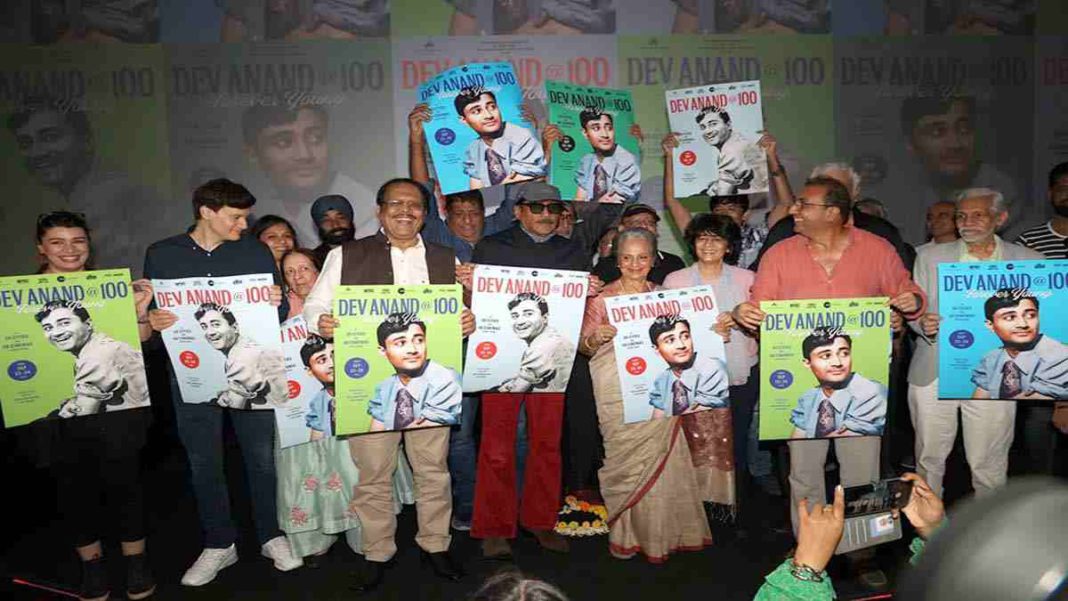INDIA: Across India, heartfelt tributes and commemorative events have been organized to honor the legendary Bollywood actor, director, and producer, Dev Anand, on the occasion of his 100th birth anniversary, which falls on Tuesday.
In a fitting homage, the National Film Development Corporation (NFDC) and the National Film Archive of India (NFAI) are hosting a special festival featuring seven of Dev Anand’s iconic films.
This cinematic celebration is taking place at the main theater within NFAI’s complex in Pune, showcasing timeless classics such as “Baazi” (1951), “CID” (1956), “Asli-Nakli” (1962), “Tere Ghar Ke Samne” (1963), “Guide” (1965), “Jewel Thief” (1967), and “Johny Mera Naam” (1970).
Adding to the grandeur of the occasion, the NFDC-NFAI has meticulously restored four films using cutting-edge 4K resolution technology. These restored classics include “Guide” (1965), “Jewel Thief” (1967), “CID” (1956), and “Johny Mera Naam” (1970).
Additionally, the Film Heritage Foundation is actively working on preserving some of Dev Anand’s 35 mm films, with financial support from the Union Ministry of Information. Given the fragile state of many old films, this meticulous preservation effort is crucial.
Furthermore, “Guide” (1965), “Jewel Thief” (1967), “CID” (1956), and “Johny Mera Naam” (1970) are being screened in 57 PVR cinemas across 30 cities, thanks to the Film Heritage Foundation (FHF). A special poster commemorating Dev Anand’s birth anniversary was unveiled by veteran actress Waheeda Rehman during these festivities, courtesy of the FHS.
Dev Anand’s devoted fans have also organized celebratory events in various states, including Rajasthan and Madhya Pradesh. Notably, a musical program at the Nehru Centre in Mumbai, spearheaded by Govind Sharma, President of the Global Dev Anand’s Forum, has been a highlight of these commemorations. Govind Sharma, hailing from Jaipur in Rajasthan, played a pivotal role in arranging this event.
A Glimpse into Dev Anand’s Life and Legacy:
Born on September 26, 1923, as Dharamdev Pishorimal Anand, the illustrious Dev Anand embarked on his journey in Mumbai from Gurudaspur (Punjab) on July 19, 1944. His cinematic career took off when he was introduced to Prabhat Films by Baburao Pai, leading to his debut film “Hum Ek Hain,” released at Mumbai’s Central Cinema on June 08, 1946. “Ziddi” (1948) followed, marking his first superhit film, and from there, there was no looking back.
Dev Anand’s remarkable career spanned 112 films, and he produced 35 films under the banner of Navketan Films. His filmography includes classics like “Kala Pani,” “Taxi Driver,” “Fantoosh,” “Nau Do Gyarah,” “Prem Pujari,” and “Hare Ram Hare Krishna,” to name a few. “Charge Sheet” (2011) marked his final film.
The actor’s unique style, characterized by rapid dialogue delivery and a distinctive nodding gesture, became iconic and was often emulated by fellow actors. His sartorial elegance, array of headgear, and unconventional shirts were frequent subjects of discussion, with Dev Anand often likened to American actor Gregory Peck. Many of his films explored cultural viewpoints and delved into socially relevant topics.
Dev Anand’s contributions were recognized with numerous awards, including Filmfare Awards for “Kala Pani” (1959) and “Guide” (1967). He received the prestigious “Padma Bhushan” in 2001 and the “Dadasaheb Phalke Award” in 2002.
The beloved actor passed away on December 03, 2011, at the age of 88, in the Washington Mayfair Hotel in London. His last rites were conducted on December 10, 2011, at Putney Well in North East London.
Notably, Dev Anand also ventured into politics, leading the “National Party” established by film industry luminaries in September 1979.
Although the party faced an untimely demise, Dev Anand chronicled his extraordinary life experiences in his biography, “Romancing With Life,” offering insights into the fascinating journey of his remarkable career.
Also Read: Sridevi’s 60th Birthday Celebrated with a Google Doodle Tribute



